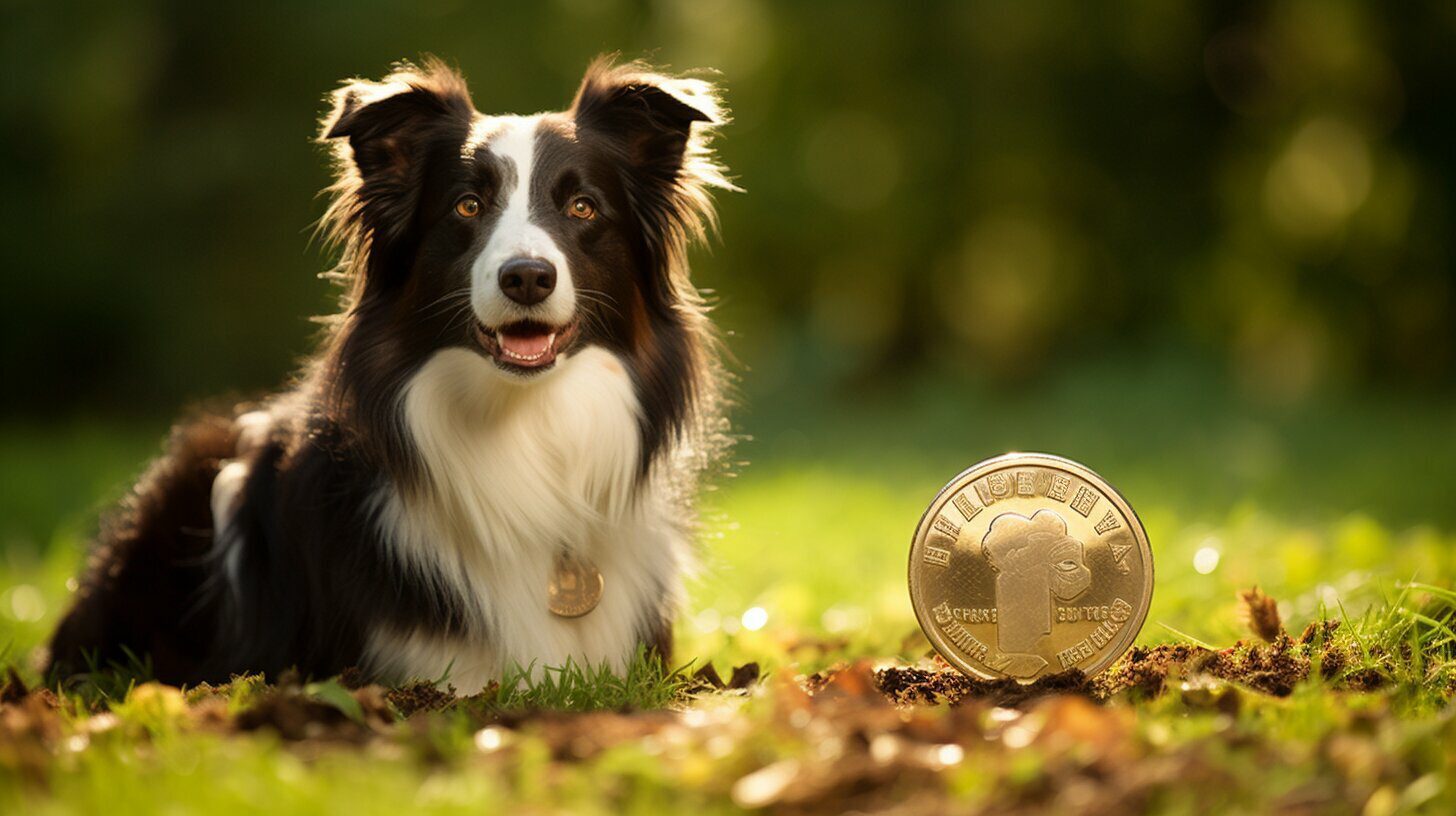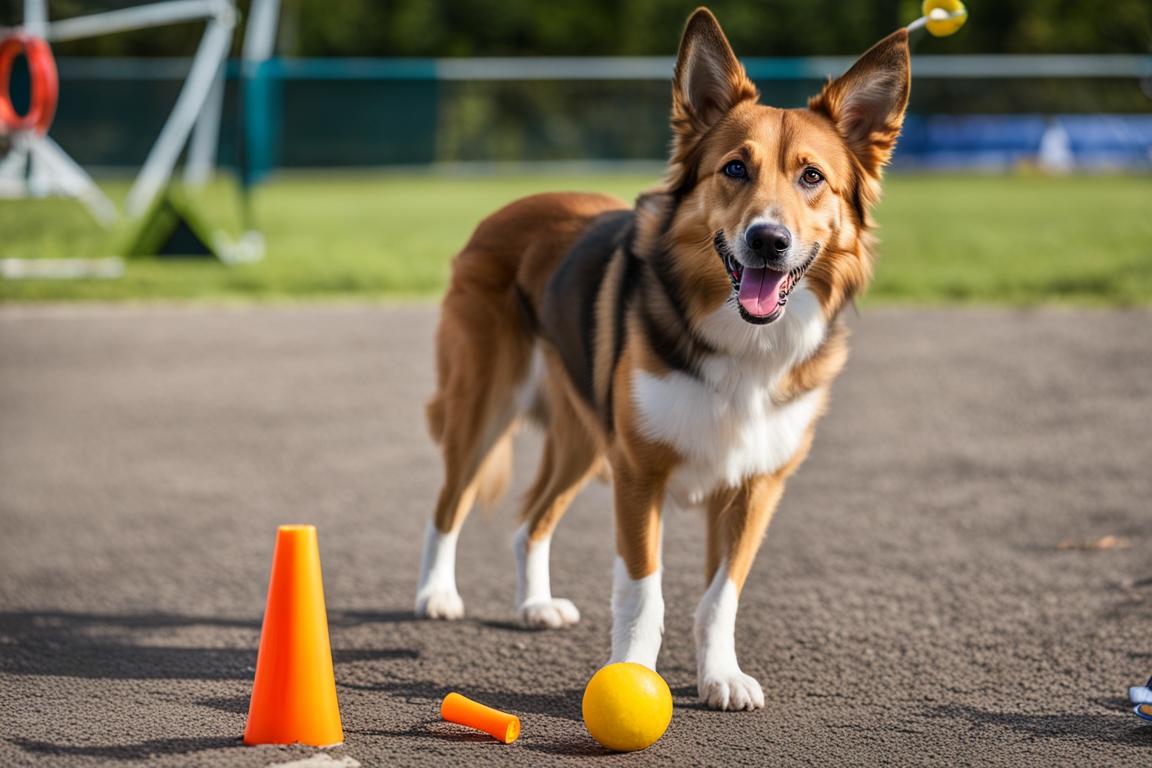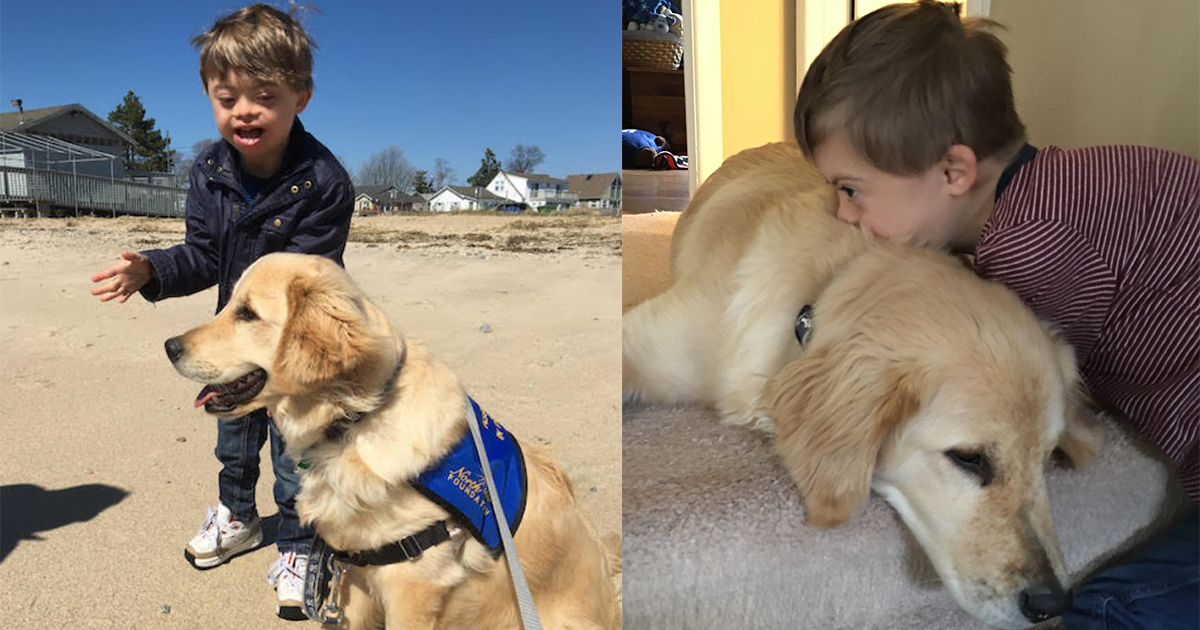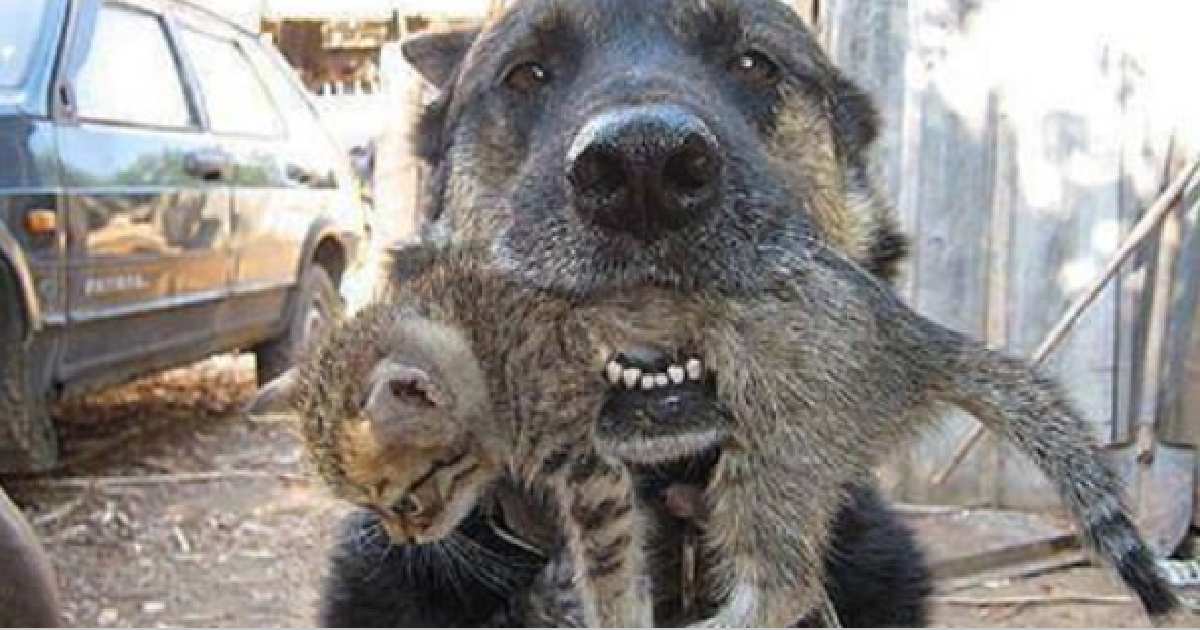Attention, curious canines, and perplexed pet parents! Have you ever taken a whiff of your furry friend’s urine and found yourself exclaiming, “Why does it smell like ammonia?” Well, fret not, for we’ve got a tail-wagging tale to tell! Prepare to embark on a scent-sational journey into the mysterious world of canine bathroom habits, where we’ll unravel the enigma behind that unmistakable ammonia odor. From the chemistry of pee to the curious canine quirks, we’ve fetched some paw-sitively fascinating information that will leave you begging for more. So, hold your noses, dear readers, and get ready to dig deep into the fascinating world of why dogs’ urine smells like ammonia. Trust us, there’s a bone-load of great info ahead that will have you howling with delight!
Dogs’ urine can smell like ammonia due to the breakdown of urea, a compound found in urine. Urea contains nitrogen, and when it breaks down, it forms ammonia. This is a natural process in the body and can be influenced by factors such as diet, hydration levels, and certain medical conditions.
What is Ammonia?
Ammonia is a colorless gas with a powerful, pungent smell. It is made from hydrogen and nitrogen and is found in small amounts in the air we breathe. It is also used in many household and industrial products.
Uses for Ammonia
Ammonia has several uses, both domestic and commercial. It is used in cleaning products as it is very good at removing dirt, grease, and stains. It is also used in some types of fertilizers, as it can help increase plants’ growth. In industry, it is used to manufacture plastics, textiles, dyes, detergents, and other chemicals.

What Causes a Dog’s Urine to Smell like Ammonia?
Your Dog’s Diet is Contributing to the Strong Smell
If your dog’s food is high in protein or specific vitamins and minerals, their urine is likely to reflect that. For example, if your dog eats a lot of meat, its urine will likely have a strong smell. This is because meat contains high levels of nitrogen, which is converted into ammonia in the body.
Similarly, if your dog eats many foods high in vitamin B6 (such as liver or sweet potatoes), your dog’s pee smells like a strong “fishy” smell. This is because vitamin B6 is broken down into compounds that can produce this type of odor. While the dog smell may be unpleasant, it’s not harmful to your dog and should dissipate over time as their diet changes. So if your dog’s urine smells like ammonia, their diet is likely a key factor causing this.
Your Dog is Dehydrated
One of the most common reasons for ammonia-smelling urine is simple dehydration. When your dog doesn’t drink enough water, its urine becomes more concentrated, and the waste products in its urine become more focused. This can cause their urine to take on a strong ammonia smell. Sometimes if you simply filter toxic wastes out of their water and improve its condition, you will notice this unpleasant odor go away.
If you think your dog may be dehydrated, offer clean, fresh water and watch to see if they drink it. Make sure your dog drinks at least a few times per day. You can also check their gums; if they’re pale or sticky, that’s another sign of dehydration. If you’re unsure, take your dog to the vet; they can perform a quick test to check your dog’s hydration levels.
Your Dog is Suffering from Kidney Disease
In some cases, ammonia-smelling urine can be a sign of kidney disease. The kidneys are responsible for filtering waste products from the blood and excreting them in the urine. When the kidneys aren’t functioning correctly, those waste products can build up in the blood and make their way into the urine, causing it to smell like ammonia.
If you think your dog may have kidney disease, take them to the vet as soon as possible. Chronic kidney disease is a severe condition that requires prompt treatment. When a dog goes into advanced kidney failure, it is an irreversible condition. So if you notice your dog’s breath smell funny or your dog’s pee smells like ammonia, kidney disease could be the culprit.
Your Dog Ate Something Ammonia-Based
Another potential cause of a dog’s urine smelling like ammonia is the recent ingestion of an ammonia-based substance. Ammonia is found in many common household cleaning products, so if your dog got into the cleaning supplies cabinet, that could be the culprit.
Ammonia is also found in some fertilizers and other lawn care products, so if your dog likes to dig in the garden, that could be another possibility for the dog’s ammonia smell.
If you think your dog has ingested something ammonia-based, call your veterinarian or local animal poison control center immediately for advice on what to do next. Do not try to induce vomiting unless instructed by a medical professional; in some cases, it could worsen the situation.
Your Dog has a Urinary Tract Infection (UTI)
Urinary tract infections (UTIs) are another possible cause of smelly urine in dogs. UTIs occur when bacteria enter the urinary tract and multiply; this can cause inflammation and pain when urinating, along with increased frequency and urgency. In some cases, UTIs can also lead to blood in the urine or cloudy urine. They are especially common in both female dogs and older dogs. One of the most noticeable symptoms is that it makes your dog’s pee smell. It can be a faint smell or a more foul odor, depending on the level of the infection.
If you notice any of these symptoms besides a strong ammonia odor, take your dog to the vet as soon as possible; a urinary tract infection requires prompt antibiotic treatment to clear up successfully. Your vet will take a urine sample to determine if an infection is present. They will likely prescribe a course of antibiotics to help clear the bacterial infection and get your dog smelling normal again.
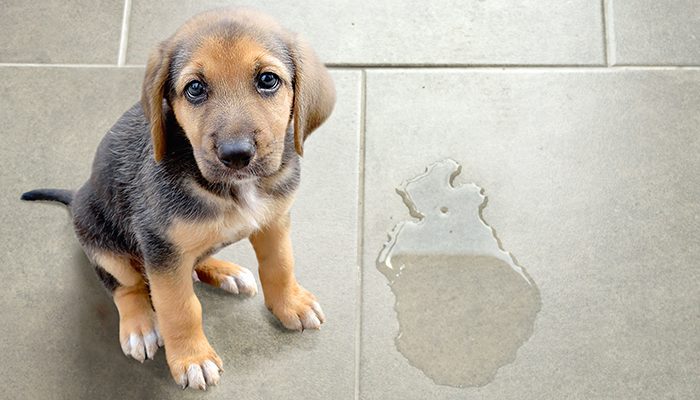
Why Does Ammonia Smell Stronger in Dog Urine?
There are a few reasons why dog urine may smell stronger of ammonia than other types of urine.
- First, dogs tend to have more nitrogen-containing compounds in their urine than other animals.
- Second, dog urine is more acidic than other types of urine, which can also contribute to the strong ammonia smell.
- Finally, dogs tend to urinate in smaller volumes than other animals, so the ammonia concentration in their urine is higher. This concentrated urine can take on different smells, like ammonia.
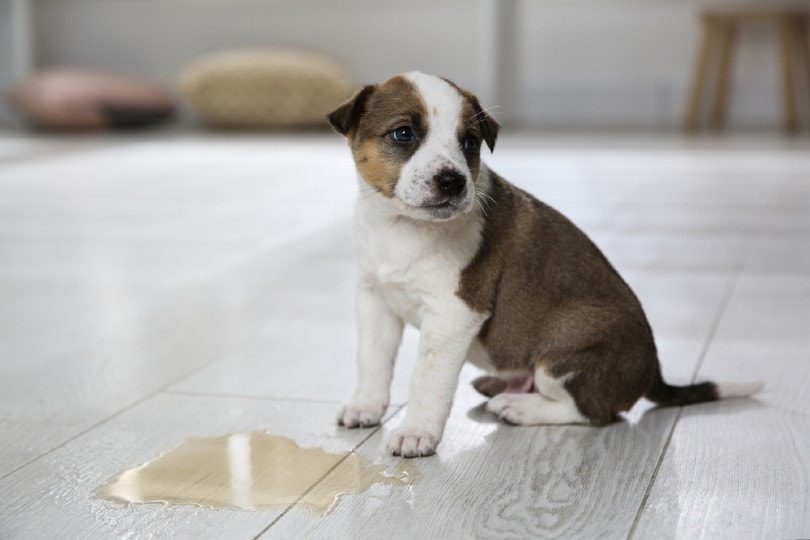
Should You See a Doctor About Urine That Smells Like Ammonia?
In most cases, there is no need to be concerned if your dog’s urine smells like ammonia. However, if you notice that your dog is urinating more frequently or producing less urine than usual, it could be a sign of dehydration, and you should take them to the vet for a checkup.
If your female dog is urinating in small amounts frequently and their urine smells solid and fishy, it could be a sign of kidney failure, and you should take them to the vet as soon as possible.

My Dogs Urine Has that ammonia smell, make it go away
The good news is that dog parents can do a few things to stop their dog’s pee from smelling like ammonia.
Keep Your Dog Hydrated
Give your dog plenty of water. Dogs need fresh water to stay hydrated and to flush out toxins from their bodies. If your dog is not drinking water, his body will start to store toxins in his urine, making it smell bad. So please make sure you always have fresh, clean water available for your dog and that he drinks at least 8 ounces of water daily. Most dog owners just assume their dog’s drink from the water bowl regularly, but there may be reasons why they don’t. So it’s something that should be monitored if you notice their urine smell like ammonia or rotten egg.
Keep Track of Your Dog’s Diet
Feed your dog a healthy diet. A healthy diet is important for all dogs but especially for dogs with urinary problems. Feeding your dog a diet that is high in fiber will help him maintain a healthy weight and will also help him have regular bowel movements. This will help keep his urinary tract healthy and free of bacteria that can cause infections and make his urine smell bad.
Maintain a Healthy Lifestyle
Make sure your dog gets enough exercise. Exercise is important for all dogs, but it’s especially important for dogs with urinary problems. Exercise helps keep their muscles strong and their bodies healthy. It also helps them relieve stress, which can sometimes trigger urinary problems. Make sure your dog gets at least 30 minutes of exercise per day.

How To Get Rid of Dog Urine Smell in the House
Use Odor Removing Bags
Odor-removing bags are just what they sound like—bags that help remove odors. These bags are typically filled with activated charcoal, known for its ability to absorb and eliminate odors. You can find these bags at most pet stores, which are relatively inexpensive.
How Do I Use Them?
The first step is to identify the areas where your dog has urinated. Once you’ve found the affected areas, place an odor-removing bag on each one. The number of bags you’ll need will depend on the size of the affected area. For example, if your dog has urinated on a small rug, you’ll probably only need one bag. However, if he’s urinated on a larger piece of furniture, you may need two or three bags.
Let the bags sit for 24 hours so that the activated charcoal has time to work its magic. After 24 hours, remove the bags and discard them in the trash. You should notice a significant reduction in urine odor.
Use an Enzyme Cleaner
The first step is to choose the right enzymatic cleaner. There are many different options on the market, so it’s important to do your research before making a purchase. You’ll want to look for a cleaner to break down pet urine odors.
Once you’ve found a few potential options, read online reviews to see what other pet owners say about them. This will help you narrow your choices and find the best product for your needs.
How to Use Enzyme Cleaner
Once you’ve selected an enzyme cleaner, it’s time to put it to use! Start by thoroughly cleaning the area where your dog urinated. If the area is dry, you can spray the cleaner on top and wipe it away with a cloth. If the area is still wet, you’ll need to soak up the urine with a paper towel or absorbent cloth before applying the cleaner.
Once you’ve done that, follow the instructions on the bottle. Most cleaners will require you to let them sit for a few minutes before wiping them away.
Enzyme cleaners are safe for humans and animals, so don’t worry about using them around your pets or children. They can be used on any surface, including carpet, tile, wood, and upholstery. Just be sure to spot-test any surfaces that aren’t fully sealed before using them—you don’t want to accidentally damage anything in your home!
Use a wet vacuum cleaner
Sometimes regular vaccuming isn’t enough to pick up dried urine crystals from your carpet and other floor surfaces. A wet vacuum cleaner will clean deeper into the areas your dog urinates, and truly cleaning the root of the problem. Sometimes a simple clean up with bleach and paper towels simply isn’t enough to get rid of the dog smell. You can also sprinkle baking soda on affected areas and let it sit for awhile before using this method.
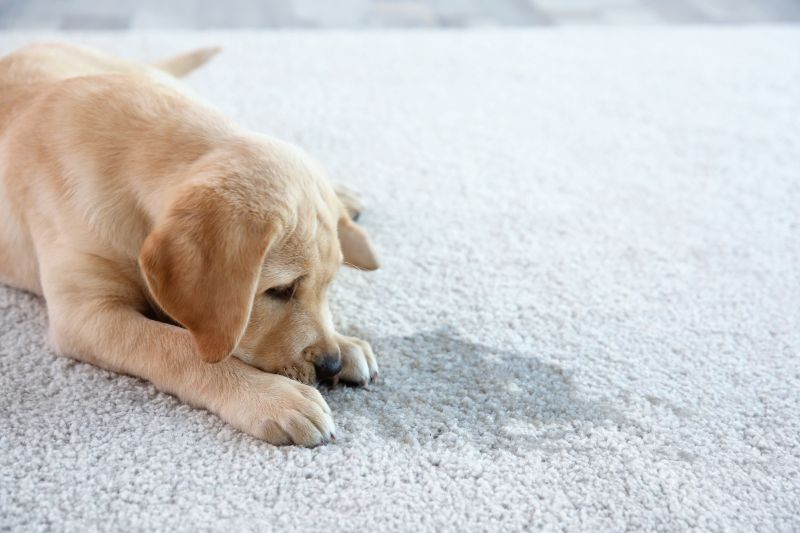
Conclusion
If you’re dealing with a dog with urinary problems, don’t despair! You can do a few simple things to help eliminate the bad odor from their urine:
Make sure they’re eating a healthy diet and getting enough exercise.
Try using an odor-removing bag or enzyme cleaner to eliminate the smell.
You’ll have your home smelling fresh and clean with a little effort, free of ammonia smells or strong urine smell.
Frequently Asked Questions
HOW CAN I REDUCE AMMONIA IN MY DOG’S URINE?
To avoid cleaning up after your dog, you must feed them food or drinks containing less protein. You can also try watering down their urine by diluting the amount of liquid in each pot before adding more ground beef, so they don’t leave deposits all over.
WHY DOES MY DOG’S URINE SMELL SO STRONG?
Most dog owners panic if their dog smells. Whether their dog’s poop smells, dog’s farts smell, or maybe even their dog’s breath smells, it’s not necessarily an immediate need for panic. A foul smell from our pee tells us there is something wrong with the balance between good bacteria and bad germs that cause infections when they’re not supposed to–like after eating some food high up on their list where all those natural enzymes are turned into flatus. It could mean a urinary tract infection is present or even possible kidney disease.
WHAT IS IT WHEN URINE SMELLS LIKE AMMONIA?
Urine that smells like ammonia is usually a sign of an underlying condition. It can be caused by bladder stones, dehydration, and even some types of bacteria or fungi. If you notice a smell like ammonia, contact your veterinarian, who can help you explore the issue and get to the root of the problem.
WHAT DOES INFECTED DOG URINE SMELL LIKE?
Good quality fresh dog urine should be odorless and have a strong, sweet smell. If your dog has urinary tract infections, bladder stones or kidney disease, you may notice ammonia smells in your dog’s urine. This suggests that you’re dealing with an infection rather than just typical wastefulness in your pet’s care.
RESOURCE: American Kennel Club (AKC)

